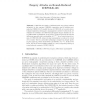Free Online Productivity Tools
i2Speak
i2Symbol
i2OCR
iTex2Img
iWeb2Print
iWeb2Shot
i2Type
iPdf2Split
iPdf2Merge
i2Bopomofo
i2Arabic
i2Style
i2Image
i2PDF
iLatex2Rtf
Sci2ools
SACRYPT
2015
Springer
2015
Springer
Forgery Attacks on Round-Reduced ICEPOLE-128
ICEPOLE is a family of authenticated encryptions schemes submitted to the ongoing CAESAR competition and in addition presented at CHES 2014. To justify the use of ICEPOLE, or to point out potential weaknesses, third-party cryptanalysis is needed. In this work, we evaluate the resistance of ICEPOLE-128 against forgery attacks. By using differential cryptanalysis, we are able to create forgeries from a known ciphertext-tag pair with a probability of 2−60.3 for a round-reduced version of ICEPOLE-128, where the last permutation is reduced to 4 (out of 6) rounds. This is a noticeable advantage compared to simply guessing the right tag, which works with a probability of 2−128 . As far as we know, this is the first published attack in a nonce-respecting setting on round-reduced versions of ICEPOLE-128.
| Added | 17 Apr 2016 |
| Updated | 17 Apr 2016 |
| Type | Journal |
| Year | 2015 |
| Where | SACRYPT |
| Authors | Christoph Dobraunig, Maria Eichlseder, Florian Mendel |
Comments (0)

